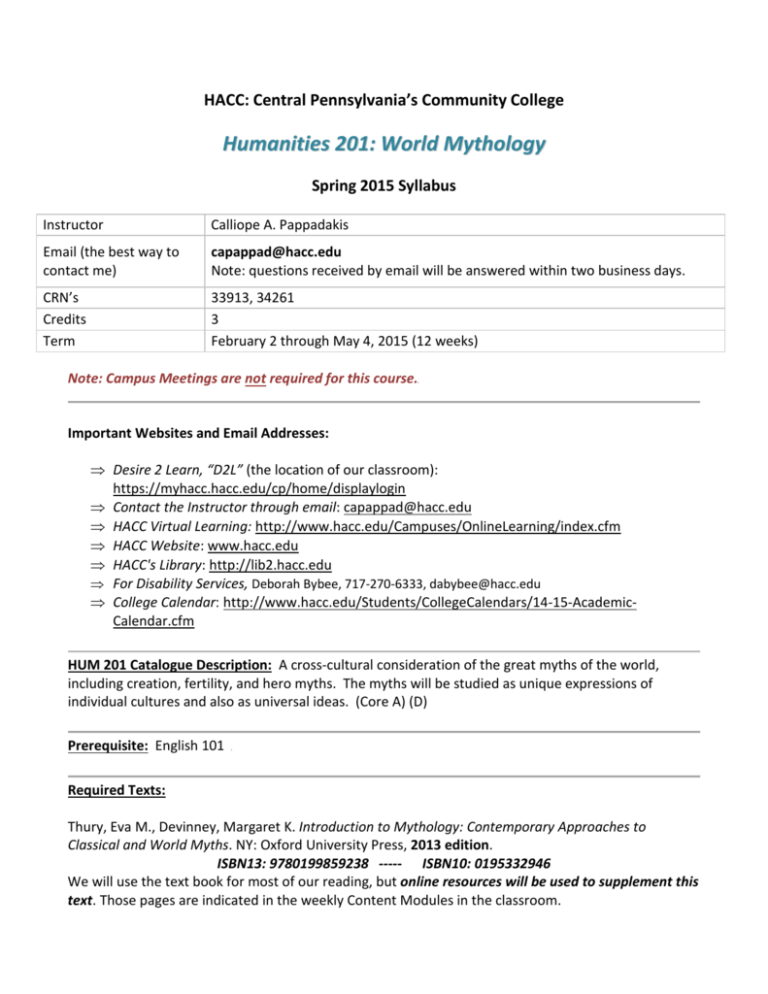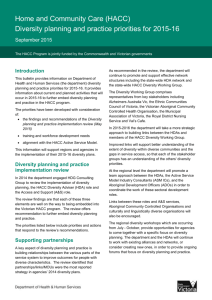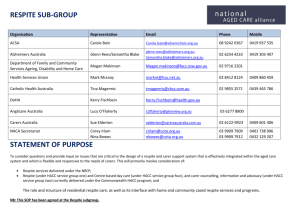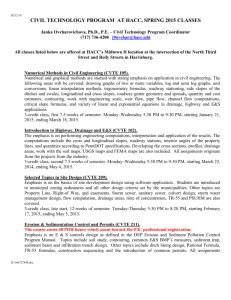Humanities 201: World Mythology
advertisement

HACC: Central Pennsylvania’s Community College Humanities 201: World Mythology Spring 2015 Syllabus Instructor Calliope A. Pappadakis Email (the best way to contact me) capappad@hacc.edu Note: questions received by email will be answered within two business days. CRN’s Credits Term 33913, 34261 3 February 2 through May 4, 2015 (12 weeks) Note: Campus Meetings are not required for this course. Important Websites and Email Addresses: ⇒ Desire 2 Learn, “D2L” (the location of our classroom): https://myhacc.hacc.edu/cp/home/displaylogin ⇒ Contact the Instructor through email: capappad@hacc.edu ⇒ HACC Virtual Learning: http://www.hacc.edu/Campuses/OnlineLearning/index.cfm ⇒ HACC Website: www.hacc.edu ⇒ HACC's Library: http://lib2.hacc.edu ⇒ For Disability Services, Deborah Bybee, 717-270-6333, dabybee@hacc.edu ⇒ College Calendar: http://www.hacc.edu/Students/CollegeCalendars/14-15-AcademicCalendar.cfm HUM 201 Catalogue Description: A cross-cultural consideration of the great myths of the world, including creation, fertility, and hero myths. The myths will be studied as unique expressions of individual cultures and also as universal ideas. (Core A) (D) Prerequisite: English 101 Required Texts: Thury, Eva M., Devinney, Margaret K. Introduction to Mythology: Contemporary Approaches to Classical and World Myths. NY: Oxford University Press, 2013 edition. ISBN13: 9780199859238 ----- ISBN10: 0195332946 We will use the text book for most of our reading, but online resources will be used to supplement this text. Those pages are indicated in the weekly Content Modules in the classroom. Learning Outcomes [§335.2] Upon successful completion of the course the student will be able to: Demonstrate an understanding of myths from across cultures, including Classical and European, Middle Eastern, Far Eastern, Egyptian, African, Pacific, and Native American cultures Demonstrate the value and purposes of myth Apply major contemporary theories used to explain and analyze myths, such as comparativist, psychological, socio-cultural, structuralist, and feminist Discuss the historical and cultural background of myth including the relationships between myth, religion, philosophy, culture, and the arts in diverse world cultures Describe myth as literature and analyze the structure of myths Explain how myth informs contemporary global art and culture Email, Contacting the Instructor, Emergencies EMAIL is the best way to reach me. If you have an emergency, send me an email (capappad@hacc.edu), or mail me in our classroom in D2L. Please include your name in all email correspondence. Attendance and Participation (AP 661) “III. E. Instructors may drop a student from a class with the concurrence of the division/campus administrator when unexcused absences exceed 15% of the total class hours... and when excessive absences preclude the possibility of a student attaining the stated learning outcomes for the course.” “According to guidance from the federal Department of Education, an institution must demonstrate that an online student participated in class or was otherwise engaged in an academically-related activity for attendance purposes. Logging into an online class without active participation does not meet their definition of attendance.” The Introduction and Participation Quiz must be completed during Week 1 to show initial academic engagement and is worth 20 points. If you do not complete the Quiz by Sunday, February 8, 2015, by 11:59PM, you will be withdrawn from the course. If you do complete it, you’ll earn up to 20 points toward your final grade. Students are expected to login regularly to the course through D2L; to participate fully in all Graded Discussion Questions on the discussion board, and complete all Quizzes, Journals and Papers by the prescribed due dates. Part of a student’s participation is his/her interaction on the discussion board. Students should login frequently to check Instructor’s Announcements (“News”), Discussion Posts, and Emails, including HAWKmail. If a student does not log in to D2L for 2 concurrent weeks, it is at the professor’s discretion to drop the student from the class; however, a student may not be withdrawn and if they discontinue attending class without contacting the instructor, they may receive an F in the course. Attendance in this course is defined by frequent logins (about 3-4 times per week) and submission of all assignments on time. Students are expected to promptly communicate with the professor if they cannot actively participate in class, login, or complete assignments. Keep in touch: Active communication is key! If for any reason the student is unable to log in to class, the student should contact the instructor so that the student is not dropped from the course. If a student loses their use of the Internet at home, or, where they normally login to class, the student is responsible for finding another Internet connection within a day or two (public library, HACC computer lab, HACC library, friend’s computer, Smart Phone, etc.) in order to login to class, contact the instructor and stay on top of course work. If you don’t attend, participate and regularly login, you cannot stay enrolled. The designations of attendance from the College’s Student Attendance Policy (AP 661) are as follows: • The determination of what constitutes an excused versus an unexcused absence shall be made by the instructor. • An instructor may require a student to furnish documentation substantiating that an absence should be considered “excused” if absences become excessive or occur at questionable times (for example, on the day of an exam). • Instructors may reduce course grades after unexcused absences exceed 10% of the total class hours that will take place throughout the semester. • Instructors may drop a student from a class with the concurrence of the division/campus administrator when unexcused absences exceed 15% of the total class hours that will take place throughout the semester and when the excessive absences preclude the possibility of the student attaining the stated learning outcomes for the course. Excused Absence An absence that occurred for reasons that were: a) beyond the student's control to prevent, and b) significant enough to prohibit attendance in class. Additionally, for the absence to be excused, the student also must also have contacted the instructor prior to or on the day of the absence. It’s important to note that, depending on the number or pattern of prior absences, an absence explained as simply ‘personal’ and ‘family emergency’ may not be considered as excused unless sufficient detail is provided to the instructor. Unexcused Absence – an absence that is not excused. Additionally, an unexcused absence is one that occurred for reasons that were: a) within the student's control to prevent, and b) not significant enough to prohibit attendance in class, even if uncontrollable. An absence may be considered unexcused if the student does not contact the instructor about the absence within a reasonable period of time. According to HACC, the " “Y” Grade - may be granted in previously approved courses when the instructor judges that the student has shown sufficient progress but needs more time to complete the course objectives." Academic Dishonesty Policy The first time a student is found representing someone else’s work, they will fail the assignment. If this infraction is found to become a habit of a particular student, he or she will be reported to the dean, and may ultimately fail the entire course. Do not copy and paste parts of online articles into your paper. You will fail the assignment if you do so. Plagiarism is a serious matter and will not be tolerated. Students who turn in formatted, organized papers, whose content contains quotes strung together from various resources, will not receive credit for the paper. Please do your own work. Students are responsible for submitting the correct/complete draft of their paper. If you turn in the wrong draft of your paper, you must submit the correct/complete draft within 24 hours. The instructor reserves the right to deduct points for lateness and incomplete work. To review HACC's Definition of Academic Dishonesty, according to Administrative Procedure 594, see below. Academic Dishonesty Definitions: Academic dishonesty is defined as an intentional act of deception in which a student seeks to claim credit for the work or effort of another person, or uses unauthorized material or fabricated information in any academic work. It includes, but is not limited to: A. Cheating – giving or receiving answers on assigned material, using materials or aids forbidden by the instructor, alteration of academic records, unauthorized possession of examinations, or the falsification of admissions, registration or other related college materials, or any other intentional use or attempted use of unauthorized materials, information, or study aid. B. Plagiarism – the offering of someone else’s work, words, or idea as one’s own or using material from another source without acknowledgement. C. Interference – interfering without permission with the work of another student either by obtaining, changing or destroying the work of another student. D. Buying or selling of term papers, homework, examinations, laboratory assignments, computer programs, etc. E. Falsifying of one’s own or another’s records. F. Knowingly assisting someone who engages in A-E above. Grade Policies (“I” Grade) at the Instructor’s discretion is given to students who require additional time to complete coursework due to mitigating circumstances. Students who desire an “I” grade to prevent withdrawal from or failure of the course, must complete an “Incomplete Grade Form” with the Instructor’s signature. Incomplete coursework must be finalized within eight weeks of the following semester to prevent a failing a grade. Depending on your situation, you may or may not receive the full 8 weeks to complete the missed work. To apply for an Incomplete Grade you must contact me prior to last day of class. According to HACC, the “I” Grade - may be awarded by the approving faculty member to students who, because of extenuating circumstances, need additional time beyond the term to complete coursework." According to HACC, the " “W” Grade - may be awarded to students who have withdrawn or have been withdrawn from a course after the refund period and through the last class day of the term/part of term. The Library There is a helpful library service called "Ask Us" on HACC's library website: http://lib2.hacc.edu/. There you can pick the brains of our discipline-specialized librarians for information on how and where to find resources. Please plan to make use of scholarly articles in Databases like EbscoHost and JStor, both of which can be found under “Databases and Journals” on http://lib2.hacc.edu HUM 201 Course Requirements The following is a list of required activities in which students must participate in order to fulfill the Course Learning Outcomes, pass the course and stay enrolled in the course. These apply to HUM 201: World Mythology. 1. “According to guidance from the federal Department of Education, an institution must demonstrate that an online student participated in class or was otherwise engaged in an academically-related activity for attendance purposes. Logging into an online class without active participation does not meet their definition of attendance.” The Introduction and Participation Quiz must be completed during Week 1 to show initial academic engaging and is worth 20 points. If you do not complete the Quiz by Sunday, February 8 2015, by 11:59PM, you will be withdrawn from the course. If you do complete it, you’ll earn up to 20 points toward your final grade. 2. Content Modules are the "sections" or "topics" we will approach on a week-to-week basis. The Contents section of the course replaces me standing in front of you in a traditional classroom setting. This is where you access the course materials related to the weekly topic. Note: Learning Modules begin at 12 AM Monday Morning and end at 11:59 PM on Sunday Night. The Learning Module will remain open throughout the entire semester, and the assignments due that week will be locked at the end of the Learning Module (11:59 PM on Sundays). At that point, we move to the next Learning Module. 3. Quizzes (200 points total – 5 Quizzes @ 40 points each) Students will take quizzes throughout the term that are valued at 40 points each, and will test students on the weekly reading material. Quizzes will be a combination of fill-in-the-blank, multiple choice, matching, true/false, and short-essay questions. Students will be given additional information during the weeks quizzes are due. The quizzes will be made available through the QUIZ link in the classroom (under Assessment). Quizzes are worth 28.57% of your grade in this class. 4. Discussion Questions – “DQ’s” (150 points total –3 DQ’s @ 50 points each) Discussions are worth 21.43 % of your grade in this class. There are 3 DQ’s each valued at 50 points. During the weeks DQ’s are due, the Graded DQ's are posted 12 AM Monday Mornings and end at 11:59 PM on Sunday Night, for a total of 5 questions throughout the semester. Students are expected to post their main message by Thursday during the weeks we have DQs so that others may have a chance to respond. Students who wait to post their main message after Thursday will lose points. To be eligible for a high mark for discussion, you must post one main message and respond substantially to at least two (2) classmates' postings for each Graded DQ for a total of 3 posts per week a DQ is assigned. Saying “I agree!” or “Great post!” is a terrific way to encourage others, but it should be followed by 2-3 substantial sentences that help develop the conversation. Find a new way to think about the topic and question. Bring something new to the table. Be original. Discussion questions (DQ's) are used in online classes to stimulate thought, disseminate information, and share ideas and, in general, to provide a connection among course participants as well as between the participants and the instructor. Questions, answers, and follow-up messages are posted in discussion forums and a "threaded" discussion is created. These messages can be replied to by others and a conversation is developed. 5. Journals (150 points total – 3 journals @ 50 points each) Journals are private writing spaces where students reflect on one of the topics we’re studying during that week. Journals are informal, but should be well-written and carefully answer the question provided. Instructions for each journal are given in the dropbox assignment area. To submit a journal, upload your Word doc to the dropbox by Sunday at 11:59pm during the week it is due. Journals are worth 21.43% of your grade in this class. 6. Mythological Figure Research Paper (180 Points /25.71% of class total) Assignment 1 Has Two Parts: PROPOSAL (Topic [name/culture of mythological figure] and 3 Resources in MLA formatting) Due for Professor Approval: Sunday, April 5, uploaded to assignment dropbox by 11:59pm (30 points) 2 weeks later… PAPER Due Sunday, April 19 uploaded to the assignment dropbox by 11:59pm (150 points) Format for Journals and Critiques • • All papers will be submitted through their own assignment link (“dropbox”) in the online classroom. The preferred format for papers is Microsoft Word (2010, 2007 or 2003 are okay). Papers will not be accepted in any other format. Other programs can be used (such as Google Documents or Open Office) as long as they saved in and submitted in the .doc format. If an assignment is submitted in a format other than the above, points will be deducted from the assignment for failure to comply with the required format for submission. • “What if I don’t have Microsoft Office (Word, Powerpoint, etc.)?” You can download a free office software program called OpenOffice that acts and looks very similar to Microsoft's products. Here is the link http://www.openoffice.org/. Once there, you can download and install the software for free. The Word equivalent is called: "Writer" and the PowerPoint equivalent is called: "Impress". Both of these programs can save in the Microsoft formats, meaning you can save it as .ppt or .doc. You have to select "save as" when saving and choose .doc (if using Writer) or .ppt (if using Impress). Otherwise it will save as a Writer file or an Impress file, depending on what program you are working in. Please save OpenOffice documents in the Microsoft Office format (.doc for Word). Late Work JOURNALS & Research Proposal/Paper cannot be turned in late unless there is an extenuating circumstances; and at the professor’s discretion, a student may be given extra time. The professor reserves the right to require documentation. If you have a conflict, contact me right away. QUIZZES cannot be submitted late unless circumstances preclude a student from taking the quiz; permission to take a past-due quiz is at the instructor’s discretion. DISCUSSIONS: Students will participate on the discussion board during weeks when a discussion is due. Discussions are open for a full week – 12 AM Monday Morning and end at 11:59 PM on Sunday Night. Graded DQ’s cannot be made up unless there are extenuating circumstances that precludes your completion of the assignment; contact the professor immediately. Late replies can’t receive any credit since they no longer further the conversation once a week has ended. Assignments and Points: All Assignment Guidelines are posted in the Course on the Homepage Assignment 1 Intro/Participation Quiz 5 Quizzes 3 DQ’s 3 Journals Mythological Figure Research Proposal (30 points) + Paper Points Per Assignment Total Points 20 points 20 points 40 points each 50 points each 50 points each 200 points 150 points 150 points 180 points 180 points Percentage 2.85% 28.57% 21.43% 21.43% 25.71% (150 points) Total Points 700 points total Grading Scale: A B C D F I W 90-100% 80-89% 70-79% 60-69% 0-59% Incomplete (630 – 700 points) (560 – 629 points) (490 – 559 points) (420 – 489 points) (0- 419 points) Withdrawn Tentative Class Schedule For more information on HACC’s events, visit the Academic Calendar. (http://www.hacc.edu/Students/CollegeCalendars/14-15-Academic-Calendar.cfm) Note: Classes Begin Monday, February 2, 2015. Please login to class that day. Week/Date Topic Intro/Participation Quiz (20 points), +Quiz Week 1 (Ch 2) Due Feb 8 (40 points), + Introduce Yourself DQ (not graded) Chapters 3-4 Journal due February 15 at 11:59 PM Chapters 5-6 DQ due February 22 at 11:59 PM Creation Myths: Icelandic/Norse (Prose Edda) Chapter 7 Quiz due March 8 at 11:59PM. Midterm break (no classes, HACC open) Creation Myths: North America and Mesoamerica (Popol Vuh) ---- ----- Chapter 8 and 11 Journal due March 22 at 11:59PM. Creation Myths: African (Uganda, Nigeria) and Chinese (“Nu Kwa” – the heroine) Destruction Myths: Roman, Hebrew and Icelandic Handout: Geomythology Reading: “Evidence for a Flood” Chapters 9 and 10 DQ due March 29 at 11:59PM. Chapters 12-14 Quiz due April 5 at 11:59PM. The Hero and the Monomyth Chapter 15 Journal due April 12 at 11:59PM. Introduction to Mythology February 2 – 8 Ways of Understanding Myth and the Insights We Gain From Them Creation Myths (“Cosmogony”): Greek and Roman (Classical) Writers: Hesiod and Ovid Creation Myths: Hebrew (The Bible, Genesis) and Mesopotamian (Enuma Elish) February 9 – 15 Week 3 February 16 – 22 Week 4 March 2-8 March 9-15 Week 5 March 16 – 22 Week 6 March 23 – 29 Week 7 March 30 – April 5 Week 8 Class Assignment/Schedule Chapters 1 – 2 Week 1 Week 2 Reading Mythological Figure Research Proposal Due Sunday, April 5, 11:59pm April 6-12 Week 9 April 13-19 Week 10 April 20-26 Week 11 April 27 through May 4 The Hero and the Monomyth in The Epic of Gilgamesh (Mesopotamia)and The Ramayana (India) Ritual and Myth & The Role of Women in Myth: Demeter and Isis Chapters 17-18 DQ due April 19 at 11:59PM. Chapters 27-29 Quiz due April 26 at 11:59PM. Myth as Literature: the Structure of Myths Chapter 45 Quiz due on May 6 (Wednesday) at 11:59 PM Leslie Marmon Silko’s “Yellow Woman” Mythological Figure Research Paper Due Sunday, April 19, 11:59pm (Classes End May 4, 2015) Classes End Monday, May 4, 2015. Final grades available to students via HACCWeb May 15, 2015. STUDENTS IN NEED OF ACCOMMODATIONS: Students with disabilities who are in need of accommodations should contact the campus disability coordinator listed below. Coordinators for each campus are listed here: http://www.hacc.edu/Students/DisabilityServices/Contact-Disability-Services.cfm EEOC POLICY 005: It is the policy of Harrisburg Area Community College, in full accordance with the law, not to discriminate in employment, student admissions, and student services on the basis of race, color, religion, age, political affiliation or belief, gender, national origin, ancestry, disability, place of birth, General Education Development Certification (GED), marital status, sexual orientation, gender identity or expression, veteran status, genetic history/information, or any legally protected classification. HACC recognizes its responsibility to promote the principles of equal opportunity for employment, student admissions, and student services taking active steps to recruit minorities and women. The Pennsylvania Human Relations Act (“PHRAct’) prohibits discrimination against prospective and current students because of race, color, sex, religious creed, ancestry, national origin, handicap or disability, record of a handicap or disability, perceived handicap or disability, relationship or association with an individual with a handicap or disability, use of a guide or support animal, and/or handling or training of support or guide animals. The Pennsylvania Fair Educational Opportunities Act (“PFEOAct”) prohibits discrimination against prospective and current students because of race, religion, color, ancestry, national origin, sex, handicap or disability, record of a handicap or disability, perceived handicap or disability, and a relationship or association with an individual with a handicap or disability. Information about these laws may be obtained by visiting the Pennsylvania Human Relations Commission website at www.phrc.state.pa.us. HACC—Lebanon Campus and Virtual Learning Deborah Bybee Coordinator, Disability Services 104R 735 Cumberland Street Lebanon, PA 17042 Phone: 717-270-6333 Email: dabybee@hacc.edu Technical Requirements for this course System Requirements: These are typical requirements of a computer system needed for D2L online courses at HACC: IBM Compatible Computer - Pentium class process (or better) with at least 64MB of RAM (128 MB recommended), with Windows 95, 98, NT, or 2000, CD-ROM drive, VGA compatible graphics, sound card and speakers, modem with a minimum speed of 56kbs (preferably faster), and a telephone line (or cable modem). OR Macintosh - Power Macintosh G3 processor, at least 64MB of RAM (128 MB recommended), modem with a minimum speed of 56 kbs (preferably faster), and a telephone line (or cable modem). You will need an Internet Service Provider (ISP) and an email account. Software Requirements: Operating System: Windows 95 or above; MAC OS 8.1 or above Course Specific Software: Office 2000 or better. All papers will be submitted as .doc or .docx attachments by each student, uploaded to the Assignment Dropbox in the classroom






